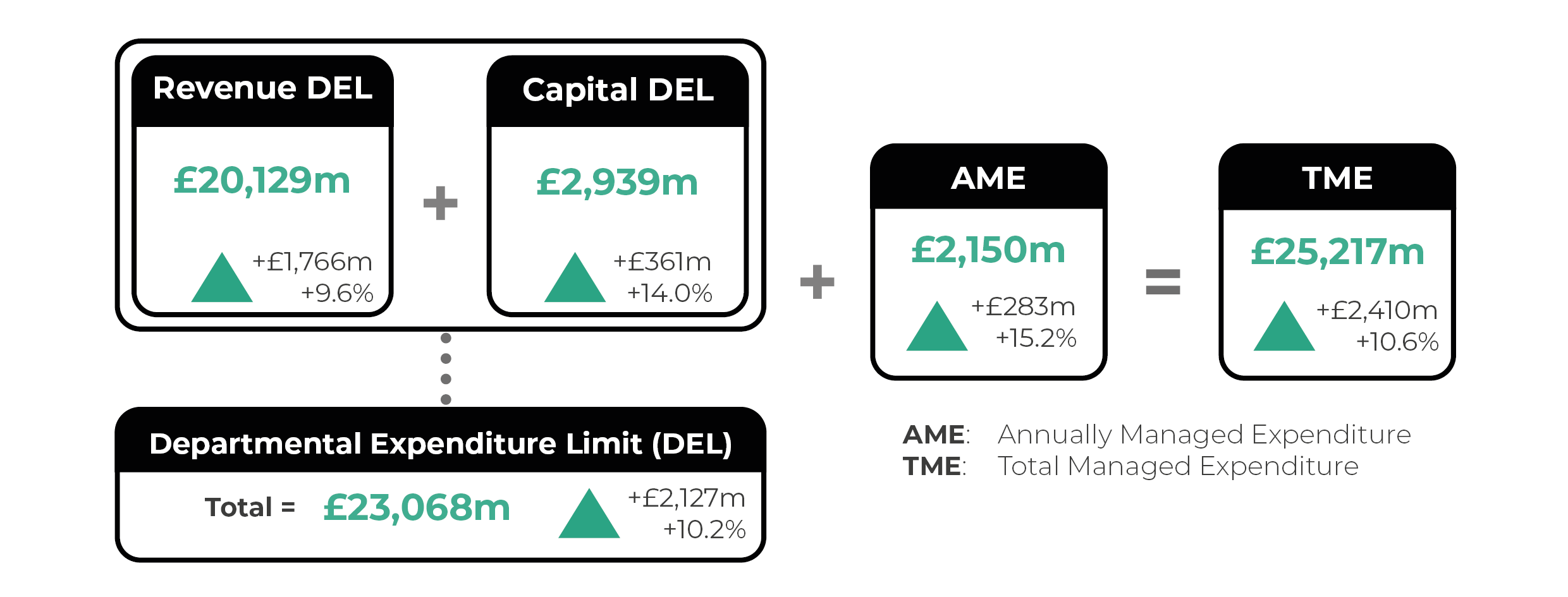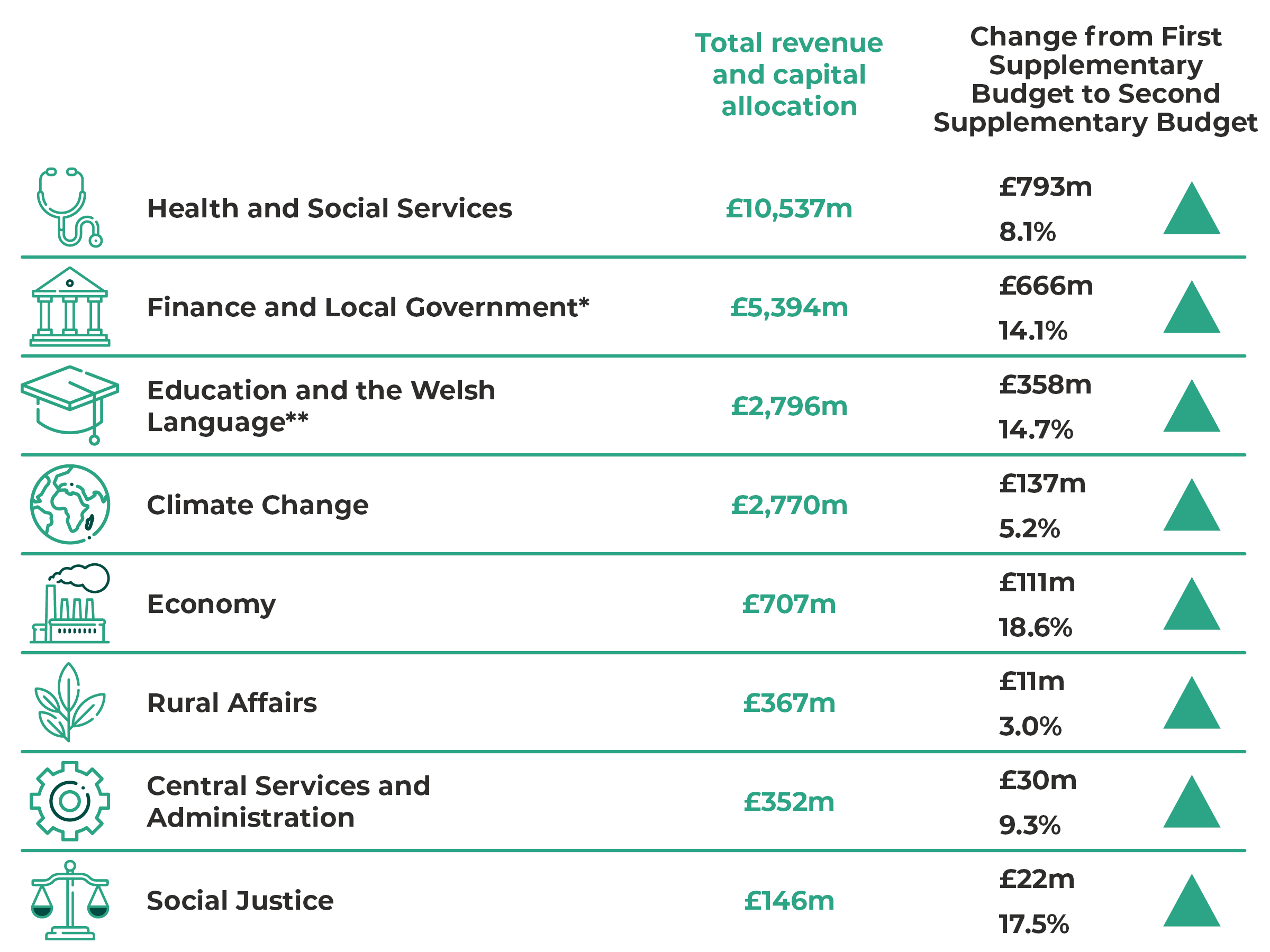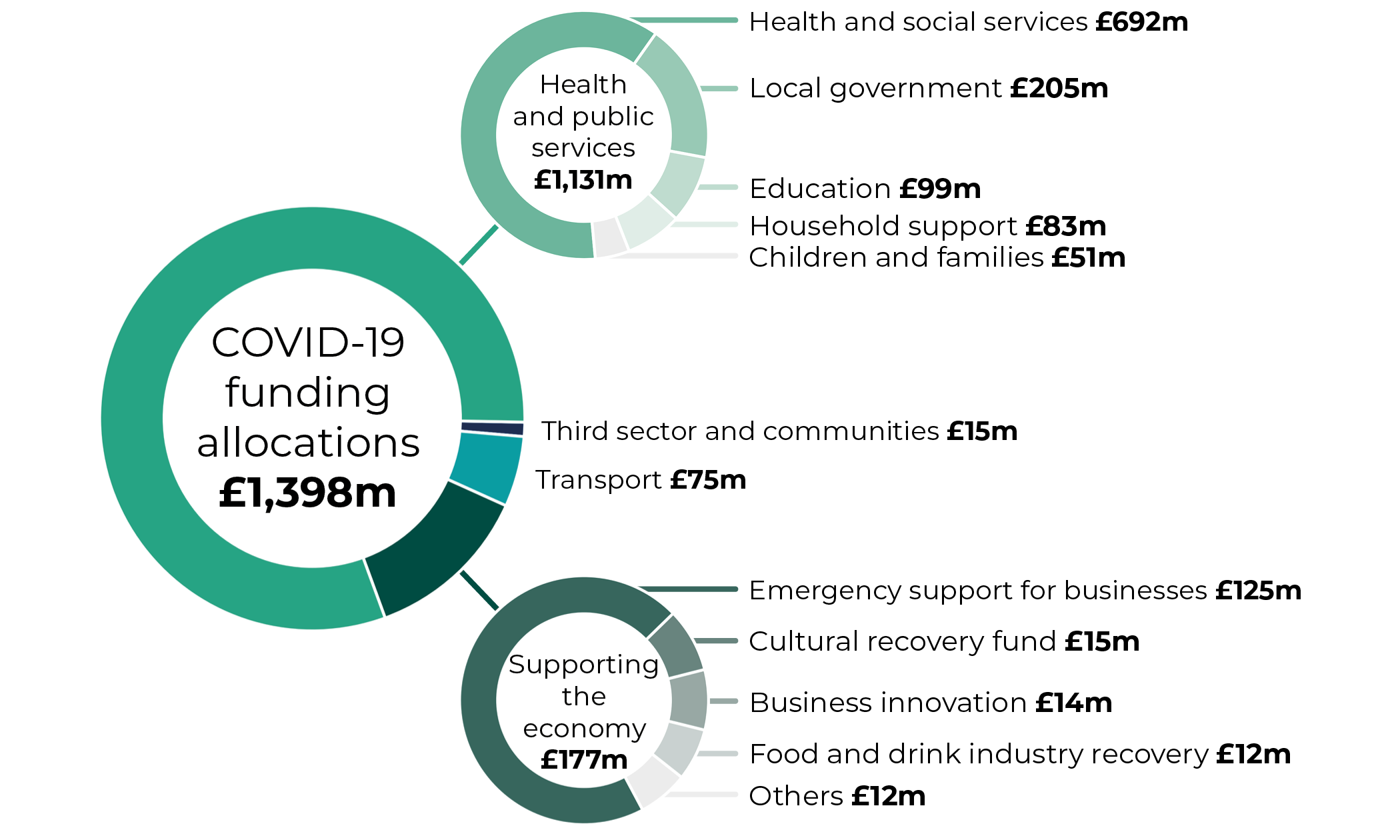On 15 February 2022, the Welsh Government published its Second Supplementary Budget 2021-22. Key allocations include funding for the response to COVID-19 and the cost of living crisis.
Why publish a Supplementary Budget?
Supplementary Budgets are the means by which the Welsh Government seeks approval from the Senedd for changes to its budget each year. This is sometimes referred to as ‘regularising’ the changes. We generally see two Supplementary Budgets annually.
This Supplementary Budget sets out the changes to the budget since the First Supplementary Budget 2021-22, published in June 2021. Many of these will already have been announced by the Welsh Government.
Welsh Government departments have an additional £2.1bn (or 10.2%) for areas of discretionary spending
The graphic below shows the changes in allocations to Welsh Government departments in this Supplementary Budget. Comparisons are made with the First Supplementary Budget for 2021-22.
The graphic shows that the Welsh Government allocates an additional £2.1bn (or 10.2%) to departments for the part of the budget it chooses how to spend, known as the Departmental Expenditure Limit (or ‘DEL’). This additional funding is available mainly as a result of spending decisions for England by the UK Government on devolved matters (known as consequential funding) and transfers from UK Government departments. The Welsh Government is also using some of its unallocated funding.
The largest increase in absolute terms is for Health and Social Services (£793m). The largest increase in percentage terms is for Education and the Welsh Language (14.7%), closely followed by Finance and Local Government (14.1%). Taken together, the increase for these three Departments accounts for over 80% of the total additional funding allocated.
Headline figures from the Second Supplementary Budget 2021-22, showing changes from the First Supplementary Budget 2021-22 (£m)

DEL is the discretionary part of the budget that the Welsh Government chooses how to spend.
AME is the non-discretionary part of the budget. It includes programmes which are large, volatile or demand-led, such as pensions.

*Excludes around £722 million non-domestic rates income.
** Includes allocation of £498 million of non-fiscal revenue due to student loans
Figures are rounded.
An additional £1.4bn has been allocated for the Welsh Government’s response to COVID-19
The Welsh Government has allocated an additional £1.4bn to respond to the ongoing impact of COVID-19 “and to continue to support the Welsh economy and ensure our public services are equipped to continue to deal with the wide-ranging challenges of the pandemic”. However, the Welsh Government notes COVID-19 allocations are not recurrent, meaning they have been provided in 2021-22 on a one-off basis.
This additional COVID-19 funding is on top of £705.6m allocated in the First Supplementary Budget 2021-22 (you can read more about that in our article from July). Since the start of the pandemic, the Welsh Government says it has allocated “more than £8.4bn to mitigate its impact”.
The Welsh Government presents its COVID-19 allocations in this Supplementary Budget under four broad themes: Health and Public Services; Supporting the Economy; Transport; and Third Sector and Communities. Around 80% of the total COVID-19 allocations is provided for Health and Public Services (£1.1bn).
COVID-19 Funding Allocations in the Second Supplementary Budget, 2021-22 (£m)

Notes:
The Welsh Government’s budget documentation identifies, in its COVID-19 funding for Education within Health and Public Services, £33m for “Learner recovery in schools including Recruit, Recover and Raise Standards Programme”. This appears not to be included in the £1.4bn allocated for COVID-19 in Table 6.1 but with the other allocations set out in the Supplementary Budget 2021-22. Our analysis reflects that classification.
The allocation for Health and Public Services includes £1.1m for “COVID-19 inquiry preparatory work”, which is not shown in the graphic above.
Allocations include:
- £551m for health and social services, comprising £411m for the ongoing costs of dealing with the pandemic until April 2022 and £140m for recovery, tackling waiting times and increasing capacity.
- £140.7m for social care recovery, including £50m towards local authorities’ projected overspends and winter pressures, £42.7m to help address social care pressures, £40m to establish a Social Care Recovery Fund and £8m for specific social care recovery activities.
- £204.8m for local government of which £135.5m has been allocated to the Local Authority Hardship Fund to 31 March 2022. It also includes an additional £50.0m for an amendment to the local government settlement, to support local authorities with pandemic related pressures.
- £125m emergency support for businesses. This includes grants of up to £6,000 linked to Non-Domestic rates, a discretionary fund for grants of £500 to £2,000 to support sole traders, freelancers and businesses who don’t pay rates and the award of grants of up to £25,000 via the Economic Resilience Fund for “severely impacted” hospitality and leisure business and their supply chains .
£177m has been allocated to help people with the cost of living crisis, in addition to its COVID-19 funding for household support
This Supplementary Budget includes £74.7m for Household Support and Winter Fuel Support (which the Welsh Government has classified as COVID-19 funding). The majority of this, £61.1m, is for a Winter Fuel Support Scheme. Under this Scheme, eligible households are able to claim a one-off £200 payment. The Welsh Government announced the increase from £100 on 1 February 2022.
As well as its COVID-19 funding, the Welsh Government makes allocations for some of its other priorities. Of the £728.7m for departmental budgets, £177.0m has been allocated to help people with the cost of living crisis.
On 14 February 2022, the Welsh Government announced a package of “expanded measures” to help people with the cost of living crisis, allocating £330m spread across the financial years 2021-22 and 2022-23.
This package includes a payment of £150 to households who live in properties in Council Tax bands A-D and also all those households in receipt of the Council Tax Reduction Scheme, irrespective of the property band. The payments, for which £152m is set out in this Supplementary Budget, will be made by local authorities “as soon as possible”.
An additional £25m is for a discretionary fund for local authorities to “use their local knowledge to help households who may be struggling”.
The Welsh Government provides additional support for the cost of living crisis in its budget for the next financial year
In its Final Budget 2022-23, published on 1 March 2022, the Welsh Government allocates £162.4m for the other measures set out in its cost of living support package. It says this is provided on:
… a time-limited one year basis aimed at helping low income households to meet the immediate pressures on living costs this winter and to reduce the impact of the cut to Universal Credit, Working Tax Credit and the rising cost of energy.
It includes funding to extend the existing Winter Fuel Support Scheme to operate for a further year (£90m) and the Discretionary Assistance Fund to run until 31 March 2023 (£15m), as well as a range of other measures.
What’s next?
The Welsh Government’s Supplementary Budget 2021-22 will be debated in Plenary on 15 March 2022, followed by a separate debate on the amendment to the local government settlement. This will be available to watch live on Senedd TV.
Article by Joanne McCarthy, Owen Holzinger and Joe Wilkes, Senedd Research, Welsh Parliament






